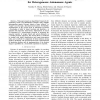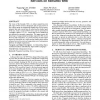61 search results - page 3 / 13 » A Framework for Organization and Representation of Concept K... |
AAMAS
2000
Springer
13 years 5 months ago
2000
Springer
We adopt the decision-theoretic principle of expected utility maximization as a paradigm for designing autonomous rational agents, and present a framework that uses this paradigm t...
NN
2008
Springer
13 years 5 months ago
2008
Springer
dely acknowledged that categorically organized abstract knowledge plays a significant role in high-order human cognition. Yet, there are many unknown issues about the nature of ho...
ICRA
2009
IEEE
14 years 12 days ago
2009
IEEE
— This paper presents an algorithmic framework for conducting search and identification missions using multiple heterogeneous agents. Dynamic objects of type “neutral” or �...
AIM
2006
13 years 5 months ago
2006
maintain awareness of its environment for a long period of time. Additionally, knowledge-intensive agents must be engineered such that their knowledge can be easily updated as envi...
WWW
2004
ACM
14 years 6 months ago
2004
ACM
The vision of the Semantic Web is to reduce manual discovery and usage of Web resources (documents and services) and to allow software agents to automatically identify these Web r...


